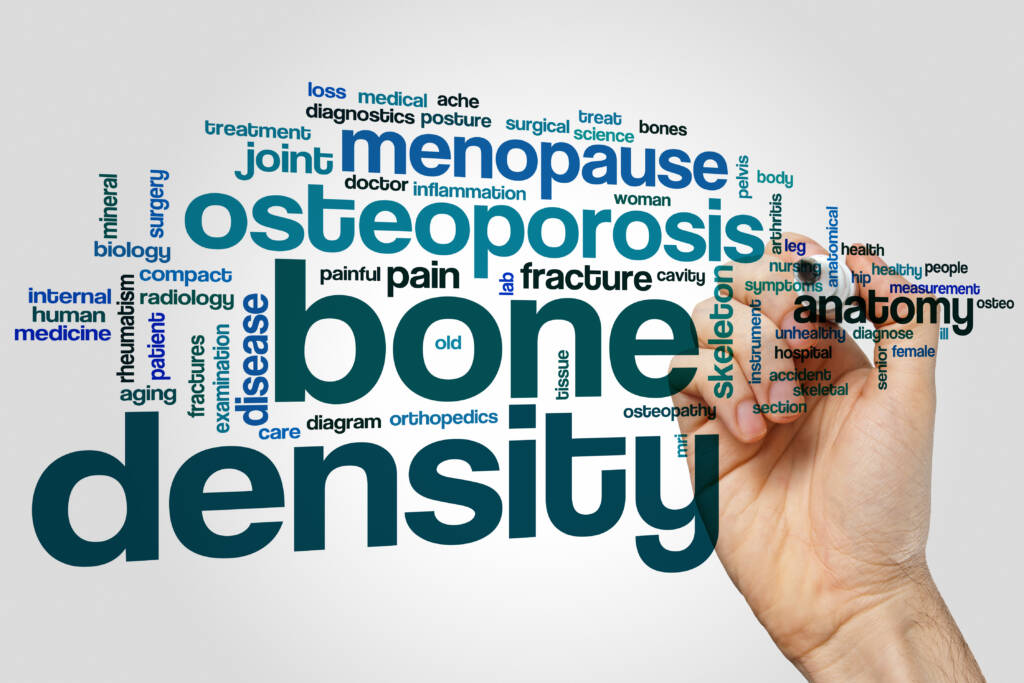Bone Health, Women's Health
Revealing How Menopause Impacts Bone Loss
Menopause is a significant transition in a woman’s life, signaling the end of her reproductive years. While the hormonal changes associated with menopause are well-known, how menopause impacts bone loss is often underestimated or not discussed at all. Let’s take a closer look at the relationship between menopause and bone loss, exploring how hormonal shifts during this phase can affect bone density and integrity.

What is the Role of Estrogen and Bone Health?
Estrogen, the main female sex hormone, plays a pivotal role in maintaining bone health. What exactly is its purpose? Estrogen works to regulate the activity of osteoblasts, which are responsible for bone formation, and osteoclasts, which break down bone tissue. During menopause, the ovaries gradually reduce their production of estrogen, causing estrogen deficiency. This imbalance disrupts the delicate balance between bone formation and resorption, resulting in a loss of bone mass.
Understanding More on How Menopause Impacts Bone Loss
The decline in estrogen levels accelerates bone turnover. This leads to weakened bones and an increased risk of fractures, especially in weight-bearing bones like the hips, spine, and wrists. Additionally, estrogen deficiency compromises bone quality by disrupting collagen synthesis, making bones more brittle and prone to fracture.
Factors that Influence How Menopause Impacts Bone Loss
Age-related declines in calcium absorption efficiency and vitamin D synthesis further compromise bone mineralization. A sedentary lifestyle, smoking, excessive alcohol consumption, and low body weight also contribute to bone loss and increase fracture risk in menopausal women.
Tips for How to Preserve Bone Health
The good news is that you can maintain optimal bone health during menopause. A balanced diet rich in calcium and vitamin D is essential for supporting bone mineralization. Incorporating dairy products, leafy greens, and fortified foods into your diet can help meet your calcium needs, while vitamin D supplementation or safe sun exposure enhances calcium absorption.
Regular physical activity, especially weight-bearing and muscle-strengthening exercises, plays an important role in preserving bone density and strength. Activities like walking, jogging, resistance training, and yoga stimulate bone formation, improve balance, and reduce the risk of falls and fractures.
Exploring Medication Options
In some cases, medications may be a consideration for some people. However, it’s important to know that medications, namely hormone replacement therapy (HRT), aren’t without certain risks. Risks include an increased likelihood of blood clots, stroke, breast cancer, and heart disease. If you have a history of these conditions, discuss risks with your healthcare provider before starting HRT to ensure you’re making the most informed decision regarding your health.
Exploring the Emotional Impact of Menopause on Bone Health
While the physical effects when menopause impacts bone health are well-documented, it’s also important to acknowledge the emotional impact of this transition as well. For many women, menopause represents not just the end of fertility but also a significant shift in identity. The hormonal fluctuations during menopause can lead to mood swings, irritability, and feelings of anxiety or depression, which can indirectly affect bone health.
Research suggests that psychological stress can contribute to bone loss by influencing hormone levels and bone metabolism. Chronic stress activates the body’s stress response system, triggering the release of cortisol, a hormone that can interfere with bone formation and promote bone resorption. Additionally, stress-induced changes in behavior, such as decreased physical activity and poor dietary choices, can further exacerbate bone loss.
Coping Strategies for Emotional Well-being and Bone Health
Addressing the emotional aspects of menopause is essential for overall well-being and bone health. Practicing stress-reduction techniques such as mindfulness meditation, deep breathing exercises, and progressive muscle relaxation can help relieve symptoms of stress and promote emotional resilience.
Engaging in activities that bring joy and fulfillment, such as hobbies, socializing with loved ones, and creative expression, can also have a positive impact on emotional health during menopause. Building a strong support network of friends, family, or support groups can provide a sense of belonging and validation, helping women navigate the challenges of this life transition.
Incorporating self-care practices into daily life, such as getting plenty of rest, prioritizing relaxation, and engaging in activities that promote self-nurturing, can also take a step toward emotional balance.
Seeking professional support from therapists, counselors, or healthcare providers trained in menopause management can provide valuable guidance and support during this transitional period.
By addressing the emotional aspects of menopause and prioritizing self-care, women can better manage the challenges of this life stage and support their overall health and well-being, including bone health.
Empowering Women to Prioritize Bone Health
Menopause impacts bone health significantly due to estrogen deficiency-induced bone loss and alterations in bone microarchitecture. Osteoporosis and fractures become major concerns for menopausal women, making proactive interventions necessary to preserve bone strength and reduce fracture risk. By adopting a comprehensive approach that encompasses dietary modifications, regular exercise, and, when appropriate, dietary supplements, women can navigate the challenges of menopause while safeguarding their bone health.
Like? Share with your friends.
Are you familiar with AdvaCAL, the #1 Bone-Building Calcium, learn more!

